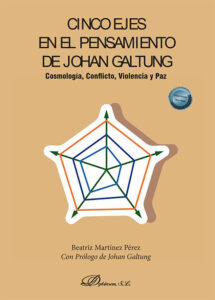(Castellano) Reseña: Cinco ejes en el pensamiento de Johan Galtung
ORIGINAL LANGUAGES, 9 Dec 2024
Beatriz Martínez Pérez | Dykinson Books – TRANSCEND Media Service
La pregunta sigue siendo el porqué de la guerra. Y es que los actos violentos de la humanidad son el resultado de situaciones y conflictos inconclusos e irresolutos que han tomado la vía de la violencia llevada al extremo (guerra) como instrumento que materializa el emergente inconsciente individual y colectivo compuesto de capas profundas de daño, sufrimiento, dolor y culpa.
Si disminuyen los actos violentos disminuirán los daños y el sufrimiento, y por ende la culpa, y si disminuye el sufrimiento y la culpa disminuirán los actos violentos tomados como venganza, reflejo del resentimiento, dejando espacio para que emerja a la superficie el lado virtuoso de la humanidad, la compasión y el amor. La comprensión del origen y las raíces subyacentes de los actos violentos llevados al extremo por la humanidad es tarea difícil.
Sin embargo, es imprescindible comprender para poder crear alternativas reales y potenciales en la construcción de sistemas pacíficos. Por lo que se hace imprescindible conocer, para comprender la condición humana en sus raíces más profundas. Será a través del estudio profundo, el análisis y la sistematización de los cinco ejes del pensamiento y la “alambicada obra Galtuniana”, como podremos alcanzar el ABC de la compresión del mundo desde el conflicto a la violencia y de la violencia a la construcción de paz.
Es importante compartir con el lector que esta es la primera parte de las dos que constituyen el trabajo en el que se revisa y se recoge la síntesis sobre la obra Galtuniana. El propósito es mostrar que el camino hacia la construcción de Paz es un Proceso con vida propia en continua impermanencia.
___________________________________________________
 Beatriz Martínez Pérez (Murcia, 1977) es doctora en Conflictología e Irenología y profesora en la Universidad de Murcia. Discípula del profesor Johan Gatung, estudia en profundidad su obra y pensamiento, formada en corrientes humanistas, contribuyendo a su legado desde la visión holística. Es vicepresidenta del Instituto Galtung España para el Estudio y Práctica de la Paz, con sede en Murcia, y colabora en investigación y docencia en América Latina: Costa Rica (UPAZ – ONU), Santiago de Chile (UBO), Uruguay (UCU), México. Cuenta con una trayectoria como trabajadora social de más de veinte años de ejercicio en la intervención social a nivel individual, grupal y colectivo.
Beatriz Martínez Pérez (Murcia, 1977) es doctora en Conflictología e Irenología y profesora en la Universidad de Murcia. Discípula del profesor Johan Gatung, estudia en profundidad su obra y pensamiento, formada en corrientes humanistas, contribuyendo a su legado desde la visión holística. Es vicepresidenta del Instituto Galtung España para el Estudio y Práctica de la Paz, con sede en Murcia, y colabora en investigación y docencia en América Latina: Costa Rica (UPAZ – ONU), Santiago de Chile (UBO), Uruguay (UCU), México. Cuenta con una trayectoria como trabajadora social de más de veinte años de ejercicio en la intervención social a nivel individual, grupal y colectivo.
Tags: Conflict Transformation, Cosmology, Direct violence, Johan Galtung, Literature, Peace, Peace Research
DISCLAIMER: The statements, views and opinions expressed in pieces republished here are solely those of the authors and do not necessarily represent those of TMS. In accordance with title 17 U.S.C. section 107, this material is distributed without profit to those who have expressed a prior interest in receiving the included information for research and educational purposes. TMS has no affiliation whatsoever with the originator of this article nor is TMS endorsed or sponsored by the originator. “GO TO ORIGINAL” links are provided as a convenience to our readers and allow for verification of authenticity. However, as originating pages are often updated by their originating host sites, the versions posted may not match the versions our readers view when clicking the “GO TO ORIGINAL” links. This site contains copyrighted material the use of which has not always been specifically authorized by the copyright owner. We are making such material available in our efforts to advance understanding of environmental, political, human rights, economic, democracy, scientific, and social justice issues, etc. We believe this constitutes a ‘fair use’ of any such copyrighted material as provided for in section 107 of the US Copyright Law. In accordance with Title 17 U.S.C. Section 107, the material on this site is distributed without profit to those who have expressed a prior interest in receiving the included information for research and educational purposes. For more information go to: http://www.law.cornell.edu/uscode/17/107.shtml. If you wish to use copyrighted material from this site for purposes of your own that go beyond ‘fair use’, you must obtain permission from the copyright owner.
Read more
Click here to go to the current weekly digest or pick another article:
ORIGINAL LANGUAGES:
